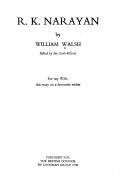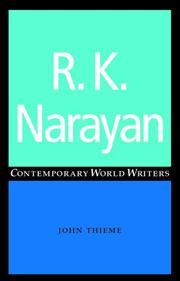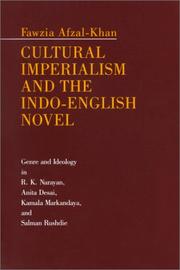| Listing 1 - 4 of 4 |
Sort by
|
Book
ISBN: 9382993835 9382993533 Year: 2013 Publisher: New Delhi : Foundation Books,
Abstract | Keywords | Export | Availability | Bookmark
 Loading...
Loading...Choose an application
- Reference Manager
- EndNote
- RefWorks (Direct export to RefWorks)
Contemporary Indian Writers in English (CIWE) is a series that presents critical commentaries on some of the best-known names in the genre. With the high visibility of Indian writing in English in academic, critical, pedagogic and reader circles, there is a perceivable demand for lucid yet rigorous introductions to several of its authors and genres. The CIWE texts cater to a wide audience - from the student seeking information and critical material on particular works to the general, informed reader who might want to know a little more about an author s/he has just finished reading. Cast in a user-friendly format and written with a high degree of critical and theoretical rigour, the texts in the series will provide astute, accessible, informed entry-points into a wide range of works and writers. CIWE, we hope, will further strengthen the interest in and readership of one of the most significant components of world literatures in English. A pioneer in Indian writings in English, R. K. Narayan's breadth of work, based on the fictitious world of the tiny Malgudi town, offers both the academic-scholar and the general reader a variety of ideas about and insights into a small town's many lives. Narayan's novels, short fiction, non-fiction and travelogues hover around sweet shop owners, schoolchildren, teachers, family planning propagandists, ghosts, criminals-turned-savants and housewives - the deceptive simplicity of his prose style offering a 'microcosm' of the Indian society, with its caste, class and gender complication. All of these essential aspects of Narayan's work come in for sustained attention in this eminently readable introduction by Mohan G. Ramanan. Ramanan posits a genealogical perspective on Narayan's themes and concerns by locating these in intellectual contexts, such as the role of English in Narayan's works and Indian Writing in English as a genre.
English Literature --- English --- Languages & Literatures --- Narayan, R. K., --- Nārāyaṇa, R. K., --- Narayanswami, Rasipuram Krishnaswami --- Narayana Swami, Rasipuram Krishnaswami Iyer, --- Naraĭan, Razipuram Krishnasvami, --- Naraĭan, R. K. --- Narayansawami, Rasipuram Krishnaswamier, --- Nārāyaṇ, Ār. Kē., --- נאראיאן, ר.ק., --- נראיאן, ר. ק., --- Criticism and interpretation.

ISBN: 0582012244 9780582012240 Year: 1971 Volume: no. 224 Publisher: Harlow: Longman,
Abstract | Keywords | Export | Availability | Bookmark
 Loading...
Loading...Choose an application
- Reference Manager
- EndNote
- RefWorks (Direct export to RefWorks)
Narayan, R. K., --- Narayan, R K, --- Criticism and interpretation --- India --- In literature --- India in literature --- Narayan, R. K. --- -Criticism and interpretation --- Criticism and interpretation. --- In literature. --- Nārāyaṇa, R. K., --- Narayanswami, Rasipuram Krishnaswami, --- Narayana Swami, Rasipuram Krishnaswami Iyer, --- Naraĭan, Razipuram Krishnasvami, --- Naraĭan, R. K. --- Narayansawami, Rasipuram Krishnaswamier, --- Narayan, Rasipuram Krishnaswami, --- Nārāyaṇ, Ār. Kē., --- נאראיאן, ר.ק., --- נראיאן, ר. ק., --- Narayanswami, Rasipuram Krishnaswami --- Narayan, R K, - 1906-2001 - Criticism and interpretation --- India - In literature --- Narayan, R K, - 1906-2001 --- Narayan (r. k.)

ISBN: 1781701245 1847791964 9781847791962 9781781701249 9780719059278 0719059275 9780719059261 0719059267 1847795366 Year: 2007 Publisher: Manchester New York New York Manchester University Press Distributed exclusively in the USA by Palgrave
Abstract | Keywords | Export | Availability | Bookmark
 Loading...
Loading...Choose an application
- Reference Manager
- EndNote
- RefWorks (Direct export to RefWorks)
R.K. Narayan's reputation as one of the founding figures of Indian writing in English is re-examined in this comprehensive study of his fiction, which offers detailed readings of all his novels. Arguing against views that have seen Narayan as a chronicler of "authentic" Indianness, John Thieme locates his fiction in terms of its specific South Indian contexts and cultural geography and its non-Indian intertexts. The study also considers the effect that Narayan's writing for overseas publication had on novels such as Swami and Friends, The Guide and The Man-Eater of Malgudi.Narayan's imaginary
National characteristics, East Indian, in literature. --- Malgudi (India : Imaginary place) --- Imaginary places --- Narayan, R. K., --- Nārāyaṇa, R. K., --- Narayanswami, Rasipuram Krishnaswami --- Narayana Swami, Rasipuram Krishnaswami Iyer, --- Naraĭan, Razipuram Krishnasvami, --- Naraĭan, R. K. --- Narayansawami, Rasipuram Krishnaswamier, --- Nārāyaṇ, Ār. Kē., --- נאראיאן, ר.ק., --- נראיאן, ר. ק., --- Criticism and interpretation. --- India --- In literature. --- Malgudi (India : Imaginary place). --- Literature --- Literary Studies: Post-Colonial Literature --- LITERARY CRITICISM / Asian / Indic --- Indian writing. --- Indianness. --- Malgudi. --- R. K. Narayan. --- cultural geography. --- fiction. --- founding figures. --- inescapability of change. --- modernity. --- non-Indian intertexts.

ISBN: 0271072210 9780271072210 0271009128 9780271009124 0271010134 9780271010137 0271032952 9780271032955 Year: 1993 Publisher: [Place of publication not identified]
Abstract | Keywords | Export | Availability | Bookmark
 Loading...
Loading...Choose an application
- Reference Manager
- EndNote
- RefWorks (Direct export to RefWorks)
Cultural Imperialism and the Indo-English Novel focuses on the novels of R. K. Narayan, Anita Desai, Kamala Markandaya, and Salman Rushdie and explores the tension in these novels between ideology and the generic fictive strategies that shape ideology or are shaped by it. Fawzia Afzal-Khan raises the important question of how much the usage of certain ideological strategies actually helps the ex-colonized writer deal effectively with postcolonial and postindependence trauma and whether or not the choice of a particular genre or mode employed by a writer presupposes the extent to which that writer will be successful in challenging the ideological strategies of ";containment"; perpetuated by most Western ";orientalist"; texts and writers. She argues that the formal or generic choices of the four writers studied here reveal that they are using genre as an ideological ";strategy of liberation"; to help free their peoples and cultures from the hegemonic strategies of ";containment"; imposed upon them. She concludes that the works studied here constitute an ideological rebuttal of Western writers' denigrating ";containment"; of non-Western cultures. She also notes that self-criticism, as implied in Rushdie's works, is not be confused with self-hatred, a theme found in Naipaul's work.
Indic fiction (English) --- Literature and society --- Imperialism in literature. --- Literature --- Literature and sociology --- Society and literature --- Sociology and literature --- Sociolinguistics --- English fiction --- Indic literature (English) --- History and criticism --- History. --- Social aspects --- Desai, Anita, --- Narayan, R. K., --- Markandaya,Kamala, --- Rushdie, Salman --- Criticism and interpretation. --- Rushdī, Salmān --- Rüşdı̂, Salman --- Ruždi, Salman --- Salamāna Raśdī --- Raśdī, Salamāna --- Рушди, Салман --- רושדי, סלמאן --- רושדי, סלמן --- رشدى، سلمان --- Anton, Joseph --- Nārāyaṇa, R. K., --- Narayanswami, Rasipuram Krishnaswami --- Narayana Swami, Rasipuram Krishnaswami Iyer, --- Naraĭan, Razipuram Krishnasvami, --- Naraĭan, R. K. --- Narayansawami, Rasipuram Krishnaswamier, --- Nārāyaṇ, Ār. Kē., --- נאראיאן, ר.ק., --- נראיאן, ר. ק., --- Anita Desai, --- Tēcāy, An̲itā, --- An̲itā Tēcāy, --- Dēśāy, Anitā̄, --- Anitā̄ Dēśāy,
| Listing 1 - 4 of 4 |
Sort by
|

 Search
Search Feedback
Feedback About UniCat
About UniCat  Help
Help News
News